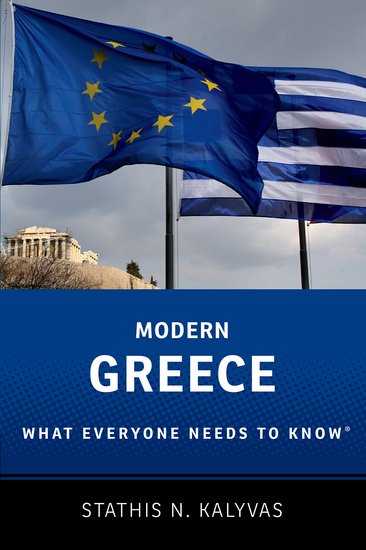Professor Stathis Kalyvas leads the Yale University program on Order, Conflict, and Violence. He is the author of “The Logic of Violence in Civil War” (2006) and “The Rise of Christian Democracy in Europe” (1996), as well as co-editor of “From Stagnation to Forced Adjustment: Reforms in Greece, 1974–2010” (2013). He recently published “Modern Greece: What Everyone Needs To Know” (2015) combining up-to-date economic and political-science findings on the current Greek crisis with a discussion of Greece’s history.
Professor Kalyvas, together with University of Macedonia Professor Nikos Marantzidis, sparked in the early 2000s a major debate on the origins and political nature of the Greek Civil War. Co-founders of the Greece-based “Civil Wars Study Group,” Kalyvas and Marantzidis recently published a comprehensive account of the Greek Civil War (“Εμφύλια πάθη: 23 ερωτήσεις και απαντήσεις για τον Εμφύλιο”) that is being widely discussed in Greece.
Professor Kalyvas is an active participant in Greek public discourse as a regular contributor of commentaries in Greek in Kathimerini daily and via comments on Twitter. He spoke to Rethinking Greece* about Greece’s Centre-Right, the Greeks’ self-perspective and the country’s historical trajectory:
Centre-Right political discourse in Greece blames the Left’s ideology and “populism” for the country’s difficulties. You seem to share this judgment especially in relation to the Greek government’s “miscalculations” during the recent euro zone negotiations. Can you tell us more?
Populism is a fuzzy term, widely debated by political scientists and sociologists. At its most basic, it refers to a political analysis and public discourse that relies on the nebulous category of “the people” which includes pretty much everyone, in contrast to a tiny “elite.” In the case of Greece, this type of analysis has blamed (and explained away) the crisis by pointing to a few corrupt politicians and businessmen who have raked up an unsustainable debt to benefit their own economic fortunes, usually with the assistance of foreign powers. The problem with this belief is that it bypasses fundamental problems of the Greek economy which have led to a wide mismatch between its productivity on the one hand and the standard of life enjoyed (and expected) by Greek society, on the other. My point is that unless Greece addresses these fundamental underlying problems, it won’t be able to exit the crisis successfully.
The Greek 1940s and the Greek Civil War have been the focus of a vivid debate among historians and political scientists in Greece, especially during the last fifteen years. Why does this debate persist? And to what extent is it relevant to political discourses involving the ongoing crisis?
For the same reason that the French still debate the French Revolution and the Americans the American Civil War. These are just critical issues in a nation’s history and are, thus, destined to generate a quasi-perpetual public debate. This does not mean that scholarly research cannot proceed, but that it will never have the ability on its own to settle matters of public and political interest in a definitive matter.
During the crisis, highly inflamed references to the civil war surfaced as a way to spearhead partisan arguments. The central role of Germany in that crisis offered a unique opportunity to populist politicians and opinion-leaders, who were able to amalgamate contemporary Germany and its WWII’s Nazi counterpart, as well as a large swath of Greek public opinion and the wartime collaborators of the German occupation of Greece. This type of discourse proved to be a key resource in the rapid political rise of SYRIZA, but has since turned into a liability, following SYRIZA’s government policy turnaround to implement austerity.
 You have published a book on Christian democracy and its importance for European politics. How does the Greek Right relate to the European conservative and liberal political traditions? And what does that mean in terms of current prospects?
You have published a book on Christian democracy and its importance for European politics. How does the Greek Right relate to the European conservative and liberal political traditions? And what does that mean in terms of current prospects?When I studied the history of many European right wing parties (often called “Christian Democratic”), I was surprised to discover that their origins were to be found in the Catholic movement of the second half of the twentieth century. This movement was initially anti-liberal, but the parties that sprang from it ended up moving toward the center of the political spectrum and became mainstays of European democracy and the European welfare state. The origins of the Greek Right are very different, both in terms of political theology (i.e. the absence of a Catholic tradition in Greece) but also politically, given that Greece never really experienced the level of industrialization that shaped West European societies. Nevertheless, after 1974, the Greek Right also moved toward the center of the political spectrum and, in this respect at least, it is no different to its West European counterparts.
In your recent book on Greece you argue that the country is (macro-historically) a success story. But how does the ongoing crisis inform Greek identity/ies, and do you think Greeks can reconstruct their self-perception in a positive perspective under the circumstances?
The crisis is not a uniform process and it has affected public perceptions in Greece in a variable manner throughout the past six years. I have the feeling that after a period of denial, there is at present a process of reconciliation with the hard economic reality, which is a precondition for making the necessary changes. Of course, whether these will take place is a completely different story. If Greece succeeds, however, this will likely shape the self-perspective of Greeks in a more positive direction, stressing the (presently feeble) ability to self-correct in the face of adversity.
 How does the crisis influence the interest in Greece and Modern Greek Studies in the US, including Yale University in particular?
How does the crisis influence the interest in Greece and Modern Greek Studies in the US, including Yale University in particular?Perhaps the only positive side effect of the crisis so far, has been the incredible level of global attention devoted to Greece, both by the mass media but also by scholars. This interest has been obvious in my home institution as well, where the Hellenic Studies Program has successfully organized a broad set of activities, from the organization of conferences and lectures to offering classes specifically tied to the Eurozone crisis and the outsized role of Greece in it. I feel that we have been able to supply our audience with a much more nuanced and sophisticated view of the developments in Europe and Greece.
Greece has been at the center of a most crucial European public debate over the last several years to the extent, as you have argued, that “the Greek crisis brought to the surface glimpses of an emerging European Demos.” Can we now re-think Greece beyond Greek exceptionalism, in a more comparative/European/global framework?
The historical trajectory of every country is composed of both domestic/endogenous processes and international/exogenous ones. Greece is no exception, if to some extent in the huge international interest it has managed to generate, in various key points of its history. For instance, its war of independence in the early 19th century was a process that fascinated European public opinion, its Civil war in the 1940s was a key moment in the Cold War, and its role in the Eurozone crisis after 2009 was equally prominent, as we all know. In my book, Modern Greece: What Everyone Needs to Know, I attempt to explain how such a small country has managed to play such an outsize international role. My explanation points to the interaction of domestic and global processes in order to explain outcomes specific to Greece. In this sense, I highlight features that are, if not unique to Greece at least quite unusual comparatively speaking, but I explain them using general theories and processes.
*Interview by Nikolas Nenedakis
See also: The Greek Civil War in Retrospect; Christian Democracy; Videos: Navarino Network: Interview with Prof. Stathis Kalyvas; Prof. Stathis Kalyvas: “What Is Greece?”
TAGS: CRISIS | HISTORY | LITERATURE & BOOKS















